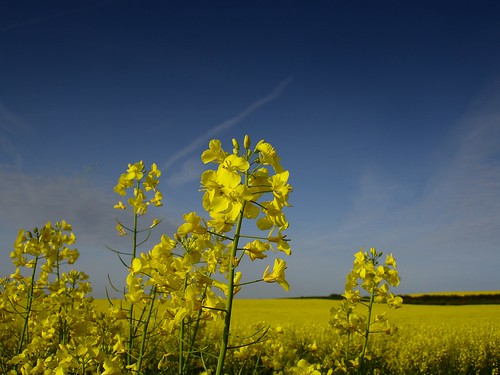 |
| Canola. Picture by net_effekt on Flickr |
While the US government continues to try to insinuate GM into organics, and the Western Australia agricultural minister, Terry Redman, wants the organic industry to allow GM contamination (see AUSTRALIAN ORGANIC FARMER IN FIRST GM CONTAMINATION LAWSUIT - October 2011), the end users are not so easily persuaded. The fact remains that organic farmers and consumers everywhere want food which has been produced by working with nature at all stages of the process. This has put organics, a lucrative and fast-developing market, on a direct collision course with GM.
Organic agriculture also highlights questions about food quality, safety and sustainability which the biotech industry would rather not visit.
However so far, the biggest issues to emerge from GM crops and from organic/GM incompatibility have been legal ones.
In America, there have been numerous incidents involving lawsuits for patent infringement filed by Monsanto against non-GM growers whose crops have been contaminated by GM material (see SLIP-SLIDING AROUND RESPONSIBILITY – September 2011). In many cases the defendants have been bankrupted. (see note below) This is another reason the biotech industry doesn't like organics: suing an organic farmer for patent infringement isn't likely to be upheld in court.
Indeed this point was recently tested by organic farmers in Minnesota and California.
The cases set a legal precedent protecting organic farms from all types of pollution routinely generated by conventional agriculture in America.
In Minnesota, the organic farm which brought the suit has repeatedly been contaminated from careless conventional farming practice going on around it since the 1990s. On appeal, the court ruled that particulate matter, including pesticides, herbicides, and GM matter, which contaminated nearby fields represents 'illegal trespass' and is subject to the same laws as other forms of trespass. (Another example of what can unfold if dedicated GM laws are not put in place, see AMERICAN FIG-LEAF 'REGULATIONS' – October 2011).
In California, an organic farmer won a $1 million law suit against a conventional farm several miles away whose pesticides were spread through fog.
Bankruptcy of contaminated US farmers
Consider the staggering figures reported by the Center for Food Safety:
“The largest recorded judgment made thus far in favor of Monsanto as a result of a farmer lawsuit is $3,052,800.00. Total recorded judgments granted to Monsanto for lawsuits amount to $15,253,602.82. Startling though these numbers are, they do not begin to tell the whole story. Many farmers have to pay additional court and attorney fees and are sometimes even forced to pay the costs Monsanto incurs while investigating them. Final monetary awards are not available for a majority of the 90 lawsuits CFS researched due to the confidential nature of many of the settlements.”Check out the whole report 'Monsanto vs. U. S. Farmers' at The Center for Food Safety.
OUR COMMENT
It must be good news when the US justice system is actually holding polluters and trespassers responsible for the damage they cause.
The implications of these rulings could be interesting. As Monsanto sues farmers for being polluted, farmers can now sue the farmers (Monsanto's customers) who polluted them.
Earlier reports suggested that some farmers were growing GM because it was the only way they could avoid being sued by Monsanto. However, now it seems that if Monsanto doesn't get them, their neighbours will.
Nice!
SOURCE
- Ethan A Huff, Court rules organic farmers can sue conventional, GMO farmers whose pesticides 'trespass' and contaminate their fields, Natural News 3.08.11
No comments:
Post a Comment
Thanks for your comment. All comments are moderated before they are published.